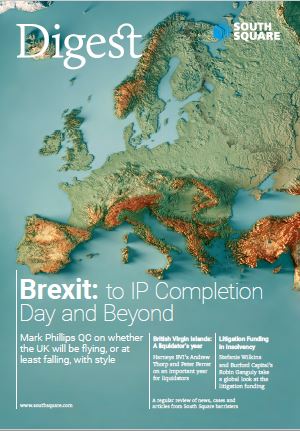

As many practitioners will know, 2019 saw a cluster of cases addressing the messy overlap between three pieces of relatively recent secondary legislation: (1) rules 3.20-3.22 of the Insolvency Rules 2016 (“IR16”) dealing with outof-court appointments by qualifying floating charge holders (“QFCs”) (introduced on 6 April 2017); (2) paragraph 2.1 of PD51O of the CPR, the Electronic Working Pilot Scheme, as amended, introduced on 6 April 2018; and (3) paragraph 8.1 of the Practice Direction on Insolvency Proceedings (“PDIP”), introduced on 4 July 2018.
As drafted, the three pieces of legislation pose difficult questions about the interaction between the general regime for the electronic filing of documents (which is broadly intended to enable all parties to issue proceedings and file documents online 24 hours a day, all year round), and the bespoke regime for the filing of notices of appointment out-of-court by QFC holders (which was an exceptional right given to QFC holders when the Enterprise Act 2002 was introduced and QFC holders lost the right to appoint administrative receivers).
Live issues include: (1) Can directors/ companies apply out-of-hours? (2) (If so) when does such an appointment take effect? (3) Are QFC holders special, and if so why? (4) (the one issue everyone appears to be agreed on) do the rules/provisions need to be changed (and, in particular, does paragraph 8.11 of PDIP need to be redrafted?)
The uncertainty is reflected (in chronological order) by: Re HMV Ecommerce Limited and HMV Retail Limited [2019] EWHC 903 (Ch) (Barling J); Re Skeggs Beef Limited [2019] EWHC 2607 (Marcus Smith J); Re SJ Henderson & Company Limited [2019] EWHC 2742 (Ch) (ICC Judge Burton); Re Keyworker Homes (North West) Limited [2019] EWHC 3499 (Ch) (HHJ Hodge QC); and Causer v All Star Leisure Group [2019] EWHC 3231 (Ch) (HHJ David Cooke).
As HHJ David Cooke said (with some judicial exasperation) at the start of his judgment in Causer v All Star Leisure Group: “[this is] another application…. as a result of uncertainties arising from the interaction of the regime for electronic filing of documents…the Insolvency Rules… and the PDIP……The very fact that such applications are having to be made and that the answers are not straightforward indicates that there is an urgent need for a review of the drafting of these provisions to ensure that they operate effectively in conjunction with each other and do not produce unnecessary traps for the unwary”.
The cry for help has not gone (completely) unheeded. On 29 January 2020, the Chancellor of the High Court, The Rt. Hon. Sir Geoffrey Vos, noted that (“the Practice Note”):
“Practitioners have expressed concern regarding the effect of the appointment of an administrator purportedly made by filing a notice of appointment via the court’s electronic filing system, outside the court’s usual counter-opening hours. It is anticipated that these issues will be addressed by amendment to the Insolvency (England and Wales) Rules 2016. Until then, court clerks will be directed to process filings in the manner set out in this note”.
The Practice Note provides that, in the case of notices of appointment by a company/its directors under paragraph 22, Schedule B1 of IA86 which are CE-filed when the court is closed, they will be referred by the court clerks “at the first possible opportunity to a specified High Court Judge. The Judge will determine the validity and, if appropriate, the time at which the appointment takes effect. The Judge’s determination will be made on paper or following a short hearing, for which he may request written or oral submissions”. In the case of an a notice of appointment which is (incorrectly) not filed under rule 3.20 of IR16 (“by fax to a designated telephone number or by email to a designated email address”), but is instead CE-filed when the court is closed, it will again “be referred at the first available opportunity to a specified High Court Judge who will determine the validity and, if appropriate, the time at which the appointment takes effect. The Judge’s determination will be made on paper or following a short hearing, for which he may request written or oral submissions”.
This note, of course, without more does not solve the inconsistent case law, with HHJ Hodge QC in Re Keyworker Homes (North West) Limited preferring (to the surprise of some) to follow Re HMV Ecommerce Limited and HMV Retail Limited (which the ILA Technical Committee had previously commented should be treated with a degree of “caution” given concerns about its “precise legal rationale”) over Re Skeggs Beef Limited and Re SJ Henderson & Company Limited.
“The very fact that such applications are having to be made and that the answers are not straightforward indicates that there is an urgent need for a review of the drafting of these provisions…”
HHJ David Cooke
The new procedure does at least put the dispute under the microscope, and disputes will now be reserved to a specified High Court Judge (who will determine both the validity of the appointment and, where appropriate, the time at which the appointment takes effect).
However, it remains unclear whether one specified judge will be allocated to deal with all out-ofhours NOAs and what factors will guide their decision, so that caution should still prevail in relation to all out of hours appointments, unless a QFC holder intends to use the designated fax/ email process provided in rules 3.20-3.22.
Pending the anticipated amendments, applying well-inside court hours remains strongly preferable to avoid potentially being summoned to an urgent and unplanned hearing.
As if there could be any doubt of this, at the time of going to press, there had been a further flurry of cases: Re Carter Moore Solicitors Limited [2020] EWHC 186 (Ch) (Snowden J); Re Statebourne (Cryogenic) Limited [2020] EWHC 231 (Ch) (Zacaroli J) Re Symm & Company Ltd [2020] EWHC 317 (Ch) (Zacaroli J).
The first addressed a director’s NOA rejected due to clerical errors with the result that the e-filing was not in fact made until the following Monday. Snowden J treated the clerical error as an error of procedure under CPR 3.10(b), which he directed should be remedies with the effect that the original filing did not fail (though he made it clear that the case was not subject to the new Practice Note, pre-dating it by a matter of days),.
In the second, Zacaroli J considered an NOA rejected on the basis of a similar defect – this time the inclusion of the incorrect court. The judge followed the approach of Snowden J in Re Carter Moore – though this time the Practice Note did apply, as the events post-dated 30 January. He was satisfied that the mistake constituted an error of procedure which could be waived pursuant to CPR 3.10(b), and directed that the NOA should be treated as having been filed at 14:54 on 31 January 20 (i.e. on the day it had initially been rejected). He noted that “I should make it clear, for obvious reasons, that wherever possible and until the position is clarified by a rule change, practitioners should attempt to avoid CE-filing a notice of appointment of administrators outside of Court hours”.
Finally, in the third and most recent decision, Zacaroli J validated an NOA that had been electronically filed by the insolvent company’s directors outside court hours, and deemed the NOA to take effect at 10am on the next working day. This was because: the out-of-hours filing was a defect that was simply an irregularity and caused no substantial injustice so could be cured under rule 12.64 of the Insolvency (England and Wales) Rules 2016 (IR 2016); and it was appropriate that an NOA filed by directors should be deemed only to take effect when the Court next opened, rather than at the out-of-hours time at which it was originally filed. This was to be contrasted with the position where an NOA was filed outside court hours by a QFC holder, where it could be appropriate that the NOA be deemed to be filed at the time it was originally submitted. This was because the IR16 and Insolvency Rules 1986 had long permitted QFCHs (and only QFCHs) to file outside court hours. The intended meaning of paragraph 8.1 of the Practice Direction on Insolvency Proceedings is to prevent any NOA from being filed electronically outside court hours. The remaining method of filing outside court hours through the email and fax process in the IR 2016 had always been intended solely for QFCHs, to compensate them for the loss of the 24- hour ability to appoint administrative receivers.
As the first post-Practice Note guidance from the High Court, and not a binding precedent, this decision hints that a future 24-hour filing window for all types of appointors is perhaps not a given.
1 This provision, described generously in the case-law as “Byzantine”, and less generously as a “clear mistake” provides that: “For the avoidance of doubt, and notwithstanding the restrictions in sub-paragraph (c) to notices of appointment made by made by QFC holders, paragraph 2.1 of the Electronic Practice Direction 51O shall not apply to any filing of appointment of an administrator outside Court opening hours, and the provisions of Insolvency Rule 3.20 to 3.22 shall in those circumstances continue to apply”.







![Brake & Anor v The Chedington Court Estate Ltd [2023] UKSC 29](https://southsquare.com/wp-content/uploads/2024/02/Brake-Anor-scaled-e1728649908896.jpeg)







